The Sundowners is a 1960 Technicolor comedy-drama film that tells the story of a 1920s Australian outback family torn between the father's desires to continue his nomadic sheep-herding ways and the wife and son's desire to settle in one place. The Sundowners was produced and directed by Fred Zinnemann, adapted by Isobel Lennart from Jon Cleary's 1952 novel of the same name, with Deborah Kerr, Robert Mitchum, and Peter Ustinov, Glynis Johns, Mervyn Johns, Dina Merrill, Michael Anderson Jr., and Chips Rafferty.

Alfred Zinnemann was an Austrian-American film director and producer. He won four Academy Awards for directing and producing films in various genres, including thrillers, westerns, film noir and play adaptations. He began his career in Europe before emigrating to the US, where he specialized in shorts before making 25 feature films during his 50-year career.
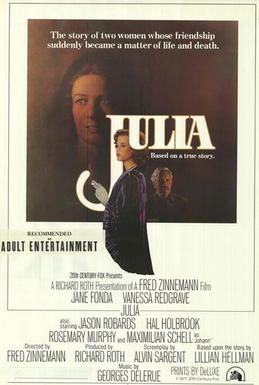
Julia is a 1977 American drama film directed by Fred Zinnemann and written by Alvin Sargent. It is based on a chapter from Lillian Hellman's 1973 book Pentimento about the author's relationship with a lifelong friend, Julia, who fought against the Nazis in the years prior to World War II. The film stars Jane Fonda as Hellman and Vanessa Redgrave as Julia. It co-stars Jason Robards, Hal Holbrook, Rosemary Murphy, Maximilian Schell, and Meryl Streep.
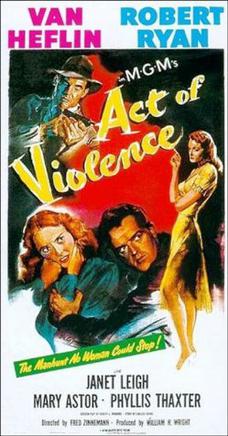
Act of Violence is a 1949 American film noir directed by Fred Zinnemann and starring Van Heflin, Robert Ryan, Janet Leigh, Mary Astor and Phyllis Thaxter. It was produced by Hollywood studio Metro-Goldwyn-Mayer. Adapted for the screen by Robert L. Richards from a story by Collier Young, the film confronts the ethics of war and was one of the first to address the problems of World War II veterans.

Elephant Walk is a 1954 American drama film produced by Paramount Pictures, directed by William Dieterle, and starring Elizabeth Taylor, Dana Andrews, Peter Finch and Abraham Sofaer. It is based upon the 1948 novel Elephant Walk by "Robert Standish", the pseudonym of the English novelist Digby George Gerahty (1898–1981).
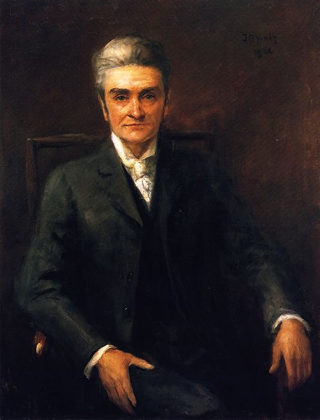
Standish James O'Grady was an Irish author, journalist, and historian. O'Grady was inspired by Sylvester O'Halloran and played a formative role in the Celtic Revival, publishing the tales of Irish mythology, as the History of Ireland: Heroic Period (1878), arguing that the Gaelic tradition had rival only from the tales of Homeric Greece. O'Grady was a paradox for his times, proud of his Gaelic heritage, he was also a member of the Church of Ireland, a champion of aristocratic virtues and at one point advocated a revitalised Irish people taking over the British Empire and renaming it the Anglo-Irish Empire.

The Nun's Story is a 1959 American drama film directed by Fred Zinnemann and starring Audrey Hepburn, Peter Finch, Edith Evans, and Peggy Ashcroft. The screenplay was written by Robert Anderson, based on the popular 1956 novel of the same name by Kathryn Hulme. The film tells the life of Gabrielle Van Der Mal (Hepburn), a young woman who decides to enter a convent and make the many sacrifices required by her choice.
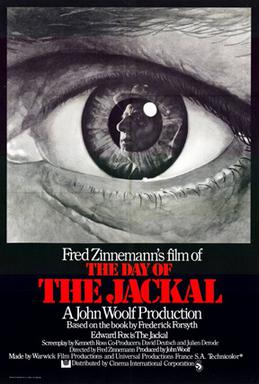
The Day of the Jackal is a 1973 political thriller film directed by Fred Zinnemann and starring Edward Fox and Michael Lonsdale. Based on the 1971 novel of the same name by Frederick Forsyth, the film is about a professional assassin known only as the "Jackal" who is hired to assassinate French president Charles de Gaulle in the summer of 1963.
Digby George Gerahty, who wrote mostly under the pen-names of Robert Standish and Stephen Lister, was an English novelist and short story writer most productive during the 1940s and 1950s. He was also a featured contributor to the Saturday Evening Post. His novels include Elephant Walk, which was later made into a film starring Elizabeth Taylor. In the semi-autobiographical Marise (1950), Gerahty claimed that he and two publicist colleagues had covertly "invented" the Loch Ness Monster in 1933 as part of a contract to improve business for local hotels; he repeated his claim to Henry Bauer, a researcher, in 1980.
Man's Fate was an abandoned 1969 film adaptation of the novel Man's Fate by Andre Malraux to have been directed by Fred Zinnemann and produced by Metro-Goldwyn-Mayer (MGM).
Albert Akst was an American musician turned film editor, played saxophone in Meyer Davis Orchestra and in vaudeville until 1930. He became a film cutter of short subjects and later became an editor on 53 feature films, including Forbidden Passage, Johnny Eager, Ziegfeld Follies, Summer Stock, Brigadoon and Meet Me in Las Vegas. He was nominated for an Academy Award for his work on Somebody Up There Likes Me.

Charles Cornwallis, 1st Marquess Cornwallis, KG, PC was a British Army officer, Whig politician and colonial administrator. In the United States and the United Kingdom, he is best known as one of the leading British general officers in the American War of Independence. His surrender in 1781 to a combined American and French force at the siege of Yorktown ended significant hostilities in North America. Cornwallis later served as a civil and military governor in Ireland, where he helped bring about the Act of Union; and in India, where he helped enact the Cornwallis Code and the Permanent Settlement.
Ralph Kemplen was a British film editor with more than fifty film credits between 1933 and 1982. He had a long collaboration with director John Huston on six films between 1951 and 1966. He also directed one feature film, The Spaniard's Curse (1958).
De Veau v. Braisted, 363 U.S. 144 (1960), is a 5-to-3 ruling by the Supreme Court of the United States that an interstate compact restricting convicted felons from holding union office is not preempted by the National Labor Relations Act or the Labor Management Reporting and Disclosure Act, does not violate the Due Process Clause of the 14th Amendment, and is not an ex post facto law or bill of attainder in violation of Article One, Section 10 of the Constitution.
Tim Zinnemann is an American film producer, former assistant director, and photographer. He is best known for his work on the films The Cowboys, The Long Riders, The Running Man and The Island of Dr. Moreau.
Sir Standish Hartstonge, 1st Baronet was an English-born lawyer who had a distinguished career as a judge in Ireland, but was twice removed from office. He was also a very substantial landowner in Ireland and England. His last years were marked by a bitter family dispute with his eldest grandson, who inherited the baronetcy, but not the family estates, which passed to the judge's youngest surviving son.

Ned Scott was an American photographer who worked in the Hollywood film industry as a still photographer from 1935 to 1948. As a member of The Camera Club of New York from 1930 to 1934, he was heavily influenced by fellow members Paul Strand and Henwar Rodakiewicz.
Rev. Sir James Hutchinson (c.1731-1813) was an Anglican priest in Ireland in the second half of the eighteenth and early nineteenth centuries.
Sir Robert Maude, 1st Baronet was an Anglo-Irish politician.
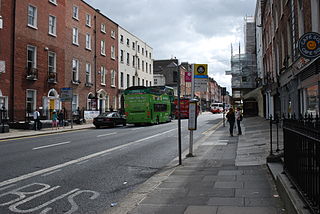
Clare Street is a street in central Dublin, Ireland.









